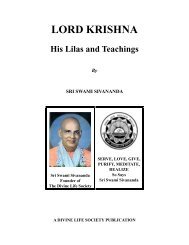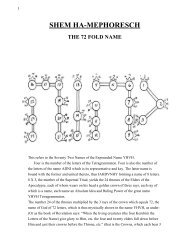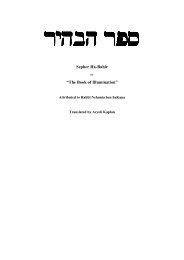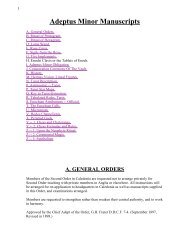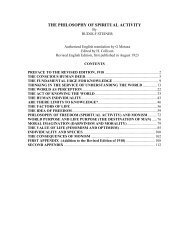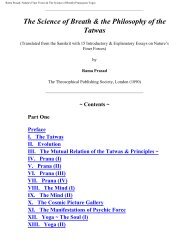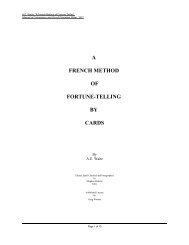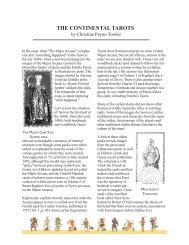Band 2 Anthropogenesis - H.P. Blavatsky
Band 2 Anthropogenesis - H.P. Blavatsky
Band 2 Anthropogenesis - H.P. Blavatsky
You also want an ePaper? Increase the reach of your titles
YUMPU automatically turns print PDFs into web optimized ePapers that Google loves.
In the exoteric works, however, the episode of the Taraka war, and some esoteric commentaries, may offer a clue<br />
perhaps. In every Purana<br />
------------------------------------------------------------------------<br />
[[Vol. 2, Page]] 498 THE SECRET DOCTRINE.<br />
the event is described with more or less variations, which show its allegorical character.<br />
In the Mythology of the earliest Vedic Aryans as in the later Puranic narratives, mention is made of Budha, the "Wise";<br />
one "learned in the Secret Wisdom," and who is the planet Mercury in his euhemerization. The Hindu Classical Dictionary<br />
credits Budha with being the author of a hymn in the Rig Veda. Therefore, he can by no means be "a later fiction of the<br />
Brahmins," but is a very old personation indeed.<br />
It is by inquiring into his genealogy, or theogony, rather, that the following facts are disclosed. As a myth, he is the son of<br />
Tara, the wife of Brihaspati the "gold coloured," and of "Soma" the (male) Moon, who, Paris-like, carries this new Helen of<br />
the Hindu sidereal Kingdom away from her husband, which causes a great strife and war in Swarga (Heaven). The<br />
episode brings on a battle between the gods and the Asuras: King Soma, finds allies in Usanas (Venus), the leader of the<br />
Danavas; and the gods are led by Indra and Rudra, who side with Brihaspati. The latter is helped by Sankara (Siva), who,<br />
having had for his guru Brihaspati's father, Angiras, befriends his son. Indra is here the Indian prototype of Michael, the<br />
Archistrategus and the slayer of the "Dragon's" angels -- since one of his names is Jishnu "leader of the (celestial) Host."<br />
Both fight, as some Titans did against other Titans in defence of revengeful gods, one -- of Jupiter tonans (in India,<br />
Brihaspati is the planet Jupiter, which is a curious coincidence); the other, in support of the ever-thundering Rudra<br />
Sankara. During this war, he is deserted by his body-guard, the storm-gods (Maruts). The story is very suggestive in<br />
some of its details.<br />
Let us examine some of them, and seek to discover their meaning.<br />
The presiding genius, or "regent" of the planet Jupiter is Brihaspati, the wronged husband. He is the instructor or spiritual<br />
guru of the gods, who are the representatives of the procreative powers. In the Rig Veda, he is called Brahmanaspati, a<br />
name meaning "the deity in whom the action of the worshipped upon the gods is personified." Hence Brahmanaspati<br />
represents the materialization of the divine grace, so to say, by means of ritual and ceremonies, or the exoteric worship.<br />
"TARA"* -- his wife -- is on the other hand the personification of the powers of one initiated into Gupta Vidya (secret<br />
knowledge), as will be shown.<br />
SOMA is the moon astronomically; but in mystical phraseology, it is also the name of the sacred beverage drunk by the<br />
Brahmins and the Initiates during their mysteries and sacrificial rites. The "Soma" plant is the asclepias acida, which<br />
yields a juice from which that mystic beverage,<br />
[[Footnote(s)]] -------------------------------------------------<br />
* See Dowson's Classical Dictionary.<br />
------------------------------------------------------------------------<br />
[[Vol. 2, Page]] 499 ALLEGORIES ON THE "WAR IN HEAVEN."<br />
the Soma drink, is made. Alone the descendants of the Rishis, the Agnihotri (the fire priests) of the great mysteries knew<br />
all its powers. But the real property of the true Soma was (and is) to make a new man of the Initiate, after he is reborn,<br />
namely once that he begins to live in his astral body (See "The Elixir of Life"*); for, his spiritual nature overcoming the<br />
physical, he would soon snap it off and part even from that etherealized form.**<br />
Soma was never given in days of old to the non-initiated Brahman -- the simple Grihasta, or priest of the exoteric ritual.<br />
Thus Brihaspati -- "guru of the gods" though he was -- still represented the dead-letter form of worship. It is Tara his wife -<br />
- the symbol of one who, though wedded to dogmatic worship, longs for true wisdom -- who is shown as initiated into his<br />
mysteries by King Soma, the giver of that Wisdom. Soma is thus made in the allegory to carry her away. The result of this<br />
is the birth of Budha -- esoteric Wisdom -- (Mercury, or Hermes in Greece and Egypt). He is represented as "so beautiful,"<br />
that even the husband, though well aware that Budha is not the progeny of his dead-letter worship -- claims the "newborn"<br />
as his Son, the fruit of his ritualistic and meaningless forms.*** Such is, in brief, one of the meanings of the allegory.<br />
War in Heaven refers to several events of that kind on various and different planes of being. The first is a purely<br />
astronomical and cosmical fact pertaining to cosmogony. Mr. John Bentley thought that with the Hindus war in Heaven is<br />
only a figure referring to their calculations of time periods (see Bentley's Hindu Astronomy).****<br />
[[Footnote(s)]] -------------------------------------------------<br />
* See "Five Years of Theosophy."<br />
** The partaker of Soma finds himself both linked to his external body, and yet away from it in his spiritual form. The latter,<br />
freed from the former, soars for the time being in the ethereal higher regions, becoming virtually "as one of the gods," and<br />
yet preserving in his physical brain the memory of what he sees and learns. Plainly speaking, Soma is the fruit of the Tree<br />
of Knowledge forbidden by the jealous Elohim to Adam and Eve or Yah-ve, "lest Man should become as one of us."<br />
*** We see the same in the modern exoteric religions.<br />
**** "Historical Views of Hindu Astronomy." Quoting from the work in reference to Aryachatta, who is said to give a near<br />
approach to the true relation among the various values for the computations of the value of [[pi]], the author of the<br />
"Source of Measures" reproduces a curious statement. Mr. Bentley, it is said, "was greatly familiar with the Hindu<br />
astronomical and mathematical knowledge . . . this statement of his then may be taken as authentic: the same



